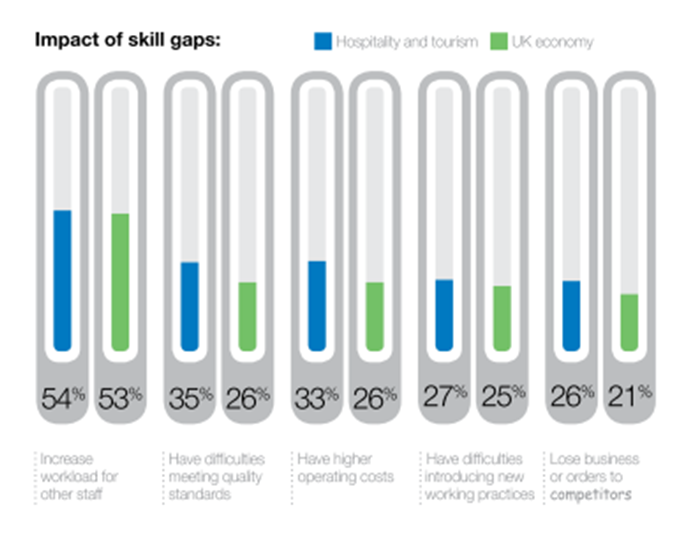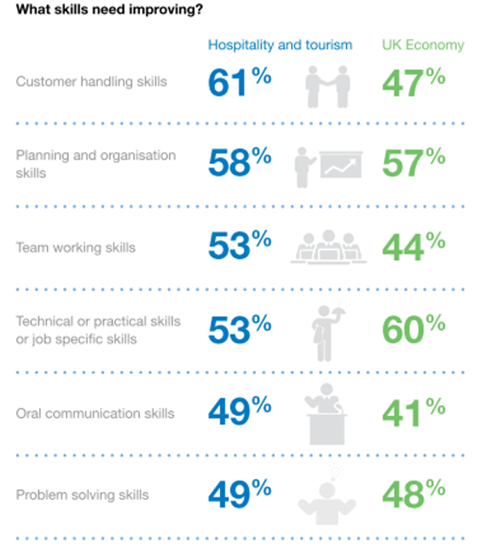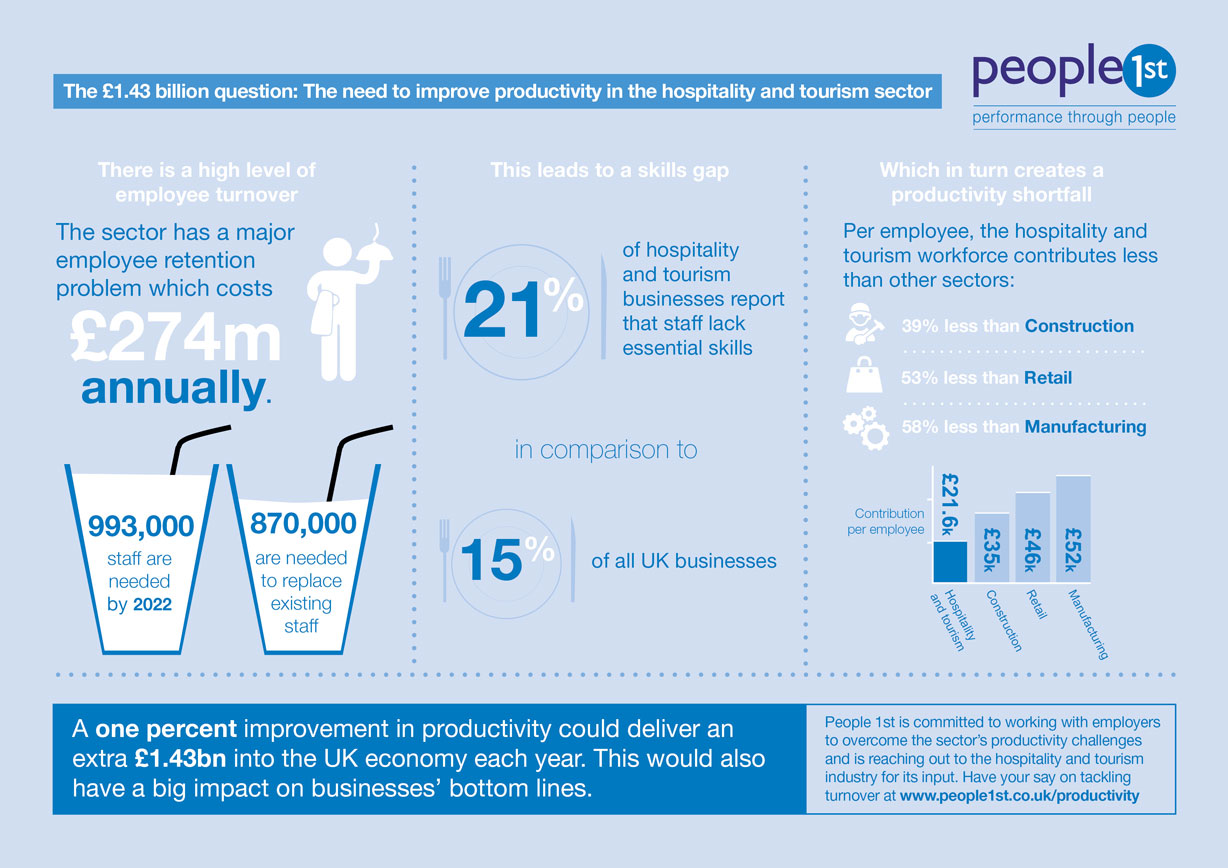
It’s understandable that the industry continues to make this demand of the government. After all, Hospitality operators have seen the cost of doing business rise substantially with the introduction of the national living wage, auto enrolment, real time information reporting, complying with new allergen rules and likely future changes to tips and gratuities.
However, given the state of the government’s finances and the drive to improve tax revenues, a VAT cut is highly unlikely. Consequently the recent increases in the cost base are here to stay for operators and likely to worsen in the future. What to do about this? Raising prices in such a competitive market with cost conscious UK consumers would probably be an unsound strategy. Instead the effective solution lies in improving the productivity of your employees.
The impact of the living wage since its introduction is being felt and will continue to be an issue up to 2020 when it increases to £9 an hour. Employers have to face the likely scenario that labour costs will rise to around 35% to 40% of turnover by the end of the decade. Such an increase in the cost of labour means you’re going to need your staff to produce/do more per hour worked.
 The good news is looking at the UK and hospitality sector it’s clear there’s plenty of room for improvement. In this country we spend just 1% of turnover in the hospitality trade on staff training. Compare this to Germany where 60% of young people in the country are said to train as apprentices.
The good news is looking at the UK and hospitality sector it’s clear there’s plenty of room for improvement. In this country we spend just 1% of turnover in the hospitality trade on staff training. Compare this to Germany where 60% of young people in the country are said to train as apprentices.
The Germans achieve this through something called dual training whereby apprentices split their days between learning at a vocational school and then putting that theory into practice in a placement with a business. What is learnt in class is reinforced in the workplace. Admittedly this comes with significant investment but it means employees have the necessary aptitude and knowledge required of a productive, high skill workforce and economy.
The skill levels of employees in the UK on the other hand can be improved considerably. Training in the hospitality industry has been notoriously inconsistent or even absent. This has made the sector very reliant on labour from overseas, think traditionally Poland, Lithuania, Estonia and more recently, Italy, Portugal and Spain. Lack of training forces operators to employ more people to cover and that in turn increases the wage bill.
 Worst of all this lack of training has become entrenched meaning high staff turnover has become a common feature of the trade. Employees don’t view these jobs as career prospects if they don’t see investment to help them develop their abilities. They thus leave to pursue opportunities elsewhere or to employers who do train. Such a regular undertaking of the recruitment process costs time and money while also potentially jeopardising trade because it can result in standards suffering.
Worst of all this lack of training has become entrenched meaning high staff turnover has become a common feature of the trade. Employees don’t view these jobs as career prospects if they don’t see investment to help them develop their abilities. They thus leave to pursue opportunities elsewhere or to employers who do train. Such a regular undertaking of the recruitment process costs time and money while also potentially jeopardising trade because it can result in standards suffering.
The hospitality sector has tended to employ people (particularly migrant labour) to simply fill the gaps. This in the main has been because wages tended to be low and there was always an abundance of people applying for vacancies. It’s all been somewhat short term and quick fix. Operators and managers now need to change their mindset.
It’s time to think differently about your staff. You need to think long term about their role and impact on your operations. Why I hear you ask? Consider their roles carefully and think how intrinsic they are/can become to your business. After all it is these people who create the dishes in the kitchen and drive the customer experience front of house. That means your business is reliant on them to innovate, improve and propel sales.
By training your staff so you can add value to your organisation and drive future profitability. For kitchen staff it’s about using their newly developed skills to be innovative in creating new dishes. Think redesigning the menu and cross selling. It means equipping your people to use their brains to help grow the top line and improve margins. That’s where training can make a real difference.
There is nothing more important than hanging on to your existing staff and improving their skill set. Why? The organisations that succeed tend to have a low turnover of people. For customers that means they see the same staff and friendly faces every time they visit your premises. They’re buying into your people and the experience as much as they are the food.
 By investing time and money in your people, they will through the process, realise that these are the actions of a good employer. They will come to understand just how good it is at your company and likely be more loyal to you. You’ll have shown that you care about them, you’re doing something for them and that’s what wins over hearts and minds. They’ll then see you in a whole new light – you’ll no longer be just the boss.
By investing time and money in your people, they will through the process, realise that these are the actions of a good employer. They will come to understand just how good it is at your company and likely be more loyal to you. You’ll have shown that you care about them, you’re doing something for them and that’s what wins over hearts and minds. They’ll then see you in a whole new light – you’ll no longer be just the boss.
Ask yourself the following questions:
The good news is apprenticeship training has changed in recent years and you should make use of it for your staff. The age range is now all inclusive and the focus of an employer should be on making use of government funding.
Apprenticeships cover all the skills, they’re not just restricted to chefs and front of service. Courses and providers are available though the National Apprenticeship Service. So long as training is structured and regular then it can be categorised as apprenticeship training and applicable for government funding.
You should be able to turn your training into a low/no cost item thereby ensuring a large amount of productive upskilling for your business. That said there’s lots of different types of training available and it can be hard to identify what you need in your business.
Thankfully there are colleges, such as Westminster Kingsway College (in London) or Oxford Brookes School of Hospitality Management (in Oxford), and training providers who can help you identify what your staff need and whether government funding is available. They’ll advise you on adhering to all the complicated rules and paperwork, of which there is a lot.
Ultimately employing fewer, more knowledgeable and skilful people will yield far better results for your business.
The content of this post is up to date and relevant as at 10/06/2016.
Please be aware that information provided by this blog is subject to regular legal and regulatory change. We recommend that you do not take any information held within our website or guides (eBooks) as a definitive guide to the law on the relevant matter being discussed. We suggest your course of action should be to seek legal or professional advice where necessary rather than relying on the content supplied by the author(s) of this blog.
Click below for office location details
leave a comment -